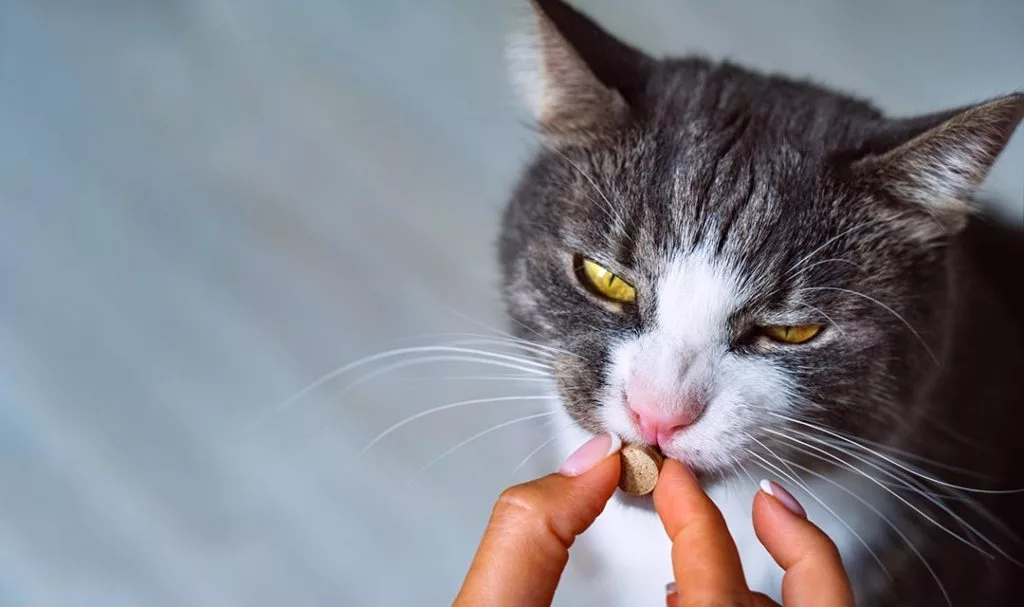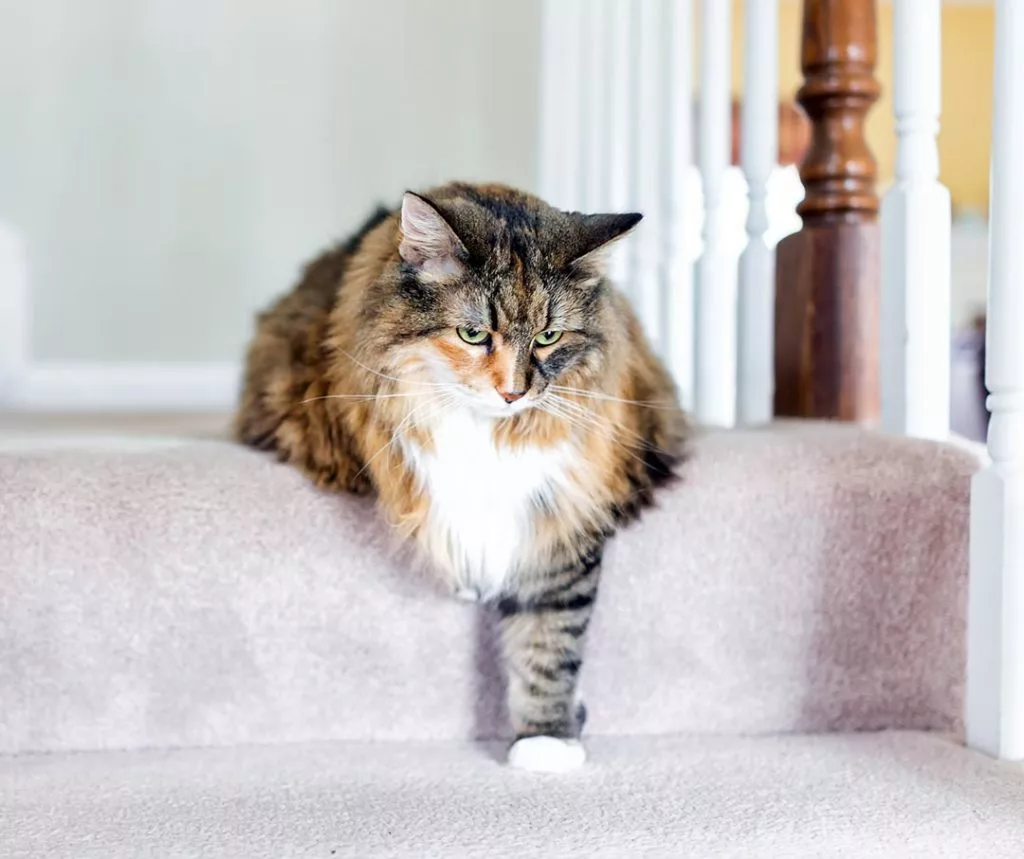Causes of Pain in Cats
There are many different causes of pain in cats. Causes can range from an injury to arthritis. Here are some of the most common causes of pain in cats:
- Bruise
- Burn
- Laceration
- Sprain
- Fractured bone
- Broken bone
- Dental disease
- Arthritis
- Ear infections
- Respiratory infections
Diagnosing Causes
You will need to talk to your vet to get a diagnosis before you can treat your cat’s pain. It is key to diagnose the cause, as some treatments work better for certain causes. It is also important because you do not want to mask a symptom that may indicate a life-threatening condition.
You may notice your cat has some of the following symptoms when they are in pain:
- Difficulty getting up or down
- Walking or moving stiffly
- Reluctance or hesitance to jump up or down
- Reluctance to jump on or off of furniture
- Reluctance to be touched or petted
- Sensitivity to touch
- Stiff joints
- Swollen joints
- Sore joints
- Irritability
- Unexpected or unexplained aggression towards others
- Difficulty getting into or out of places (especially litter boxes)
- Hiding more than usual
- Trouble grooming or grooming less
- Sleeping more than usual
- Lameness in one or more legs
You will also want to try and determine what level of pain your cat is in. your vet can help you with this. However, here are some basic guidelines.
Mild
Your cat may be sensitive to touch, and may withdraw and hide or sleep. They can still move around, but seem unsure if they want to move.
Mild to Moderate
Your cat spends more and more time sleeping, hiding, or not moving. They may flinch when you touch them, and may seem grumpy. They may be having trouble grooming themselves.
Moderate
Your cat may have trouble moving around, and may lick at an area excessively. They may have trouble getting to the litter box in time. They may yowl, growl, or hiss, and seem upset or angry. They may be unwilling to be touched. They may not want to move from their spot.
Moderate to Severe
Your cat may refuse to move at all, and may be lying prostrate. They may be breathing harshly, and may not respond to you. They may seem to lack the energy to growl or hiss, or swipe at you when you touch them.

Treating Pain in Cats
There are many different types of treatment for pain in cats these include:
- Non-steroidal anti-inflammatory medications
- Opioids
- Supplements
- Treatments or Therapy
Medications
In severe cases of pain your vet may prescribe opioids or steroid drugs to lessen the pain. However, your cat should never be on these medications for a long period of time. Non-steroidal anti-inflammatories (NSAIDs) are another option and are commonly used in cases such as arthritis or chronic pain.
Never give your cat human medications as these can be deadly. Even if the medication is the same as a pet one, human meds have a much higher dosage. Your vet can prescribe the proper dose for your cat.
Common medications that vets prescribe include:
- Onsior (robenacoxib) – NSAID
- Metacam (meloxicam) – NSAID
- Buprenorphine – Opioid
- Tramadol – Opioid
- Duragesic (Fentanyl patch) – Opioid
- Corticosteroids
- Neurontin (Gabapentin)
- Cerenia (maropitant)
- Amantadine
- Amitriptyline
Supplements
For chronic conditions, supplements can help maintain a pain-free or minimal pain life. Vets will usually prescribe one or more of the following supplements for your cat.
Omega-3 Fatty Acids
You can get these with fish oil or fish oil pills or tablets. They can help decrease inflammation in the joints.
Glucosamine
Supports bone and cartilage health
Chondroitin
When paired with glucosamine, seems to increase both its effectiveness and that of glucosamine
Adequan (Polysulfated Glycosaminoglycans)
These are prescription only and are administered through an injection.
Therapies and Treatments
Just like with humans, there are a number of treatment options. These include:
Laser Therapy
Cold lasers can decrease inflammation and pain. It starts with multiple appointments and then tapers off to more spread-out treatments.
Acupuncture
Acupuncture may help. Appointments are usually scheduled at certain intervals. Not all cats will be agreeable, so it is important to do a trial run. It is also important to make sure you get a licensed acupuncturist.
Stem Cell Therapy
Stem Cell Therapy has shown promise with dogs. There is still research being done on its effectiveness for cats.
Warm/Cold Compresses
Applying warm and cold compresses can help alleviate pain and reduce swelling.
Surgery
Surgery may be necessary in severe cases or in cases of injury. Your vet can talk you through your options.
Caring for a Cat in Pain
Beyond medications, supplements, and therapies, there are things you can do at home to help your cat out.
Put Their Essentials in Easy to Get to Places
Essentials include food, water, litter box, bedding, etc. If you live in a two story or larger home, you will want one of everything for every floor of your house.
Block Areas That Are Dangerous
These may include stairs or other places where your cat has to go up and down. If your cat wants to be with you, carry them gently up or down stairs. Make sure to place them in a soft spot on the floor.
Add Cat Ramps or Stairs
If your cat is having trouble with the litter box, you can either get a ramp or buy a litter box that has a ramp. Make sure any stairs you make are easy to use for your cats. You can build or buy stairs and ramps so that your cat can get to favorite places.
Wood Floors? Purchase Some Rugs.
These rugs, or mats, will help prevent your cat from slipping or falling.
Purchase a Comfy Cat Bed
If they don’t already have one, a soft place to sleep is ideal for cats. Especially if they have chronic pain. Just make sure they can get in and out of the bed easily.
Reach Out to Our Crown Point, IN, Veterinarians for Your Cat’s Pain Relief
Whether your cat’s pain is temporary or chronic there are many options available to you. Our Crown Point, IN, animal hospital can work on the best combination of treatments, supplements, and medications.
Be sure to stop by our Crown Point, IN, animal hospital so we can exam your cat and help with their pain relief.




